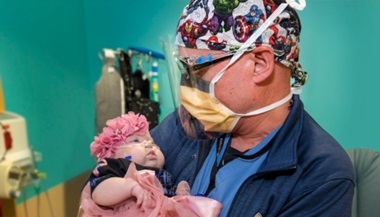Tracheoesophageal Fistula
Featured Expert:
What is tracheoesophageal fistula?
Tracheoesophageal fistula (TEF) is an abnormal connection between the esophagus and trachea. TEF occurs when the wall that normally separates the esophagus and trachea does not form correctly before birth. Because the tubes are connected, swallowed food or liquid can be inhaled into the lungs. TEF is most often associated with esophageal atresia, in which part of the esophagus is missing, causing it to grow in two unconnected segments.
Some patients may develop TEF as a complication from a previous surgery that may cause a leak in the esophagus. In some patients with airway issues, TEF may have been missed during their initial evaluation and surgery. It’s important for children with airway issues to be evaluated and treated by an experienced team.
What are the symptoms of tracheoesophageal fistula?
For babies who have TEF as well as esophageal atresia, symptoms of TEF that may occur soon after birth include trouble breathing or coughing or choking when trying to swallow. They may show additional symptoms due to the esophageal atresia, depending on the type of esophageal atresia.
Babies who have TEF by itself may not show symptoms right away. Symptoms that may develop later include coughing during feeding, or frequent lung infections.
How is tracheoesophageal fistula diagnosed and treated?
Most occurrences of TEF are associated with esophageal atresia and are identified during treatment for esophageal atresia. TEF may be difficult to identify. Our team has the expertise to find occurrences of TEF that would otherwise be missed.
Surgical treatment involves dividing and separating the two ends of the fistula to close them off. This is done as part of your child’s overall surgical treatment for esophageal atresia.
Recurrent TEF
In the setting of prior operations or procedures to treat TEF, the development of a recurrent TEF is a rare but difficult complication to treat. Methods including posterior tracheopexy may allow for safe and effective repair.
Follow-up care
After your child’s surgery, your child will need to be monitored, depending on their individual needs. TEF is often associated with esophageal atresia — learn more about treatment and follow-up care for esophageal atresia.






